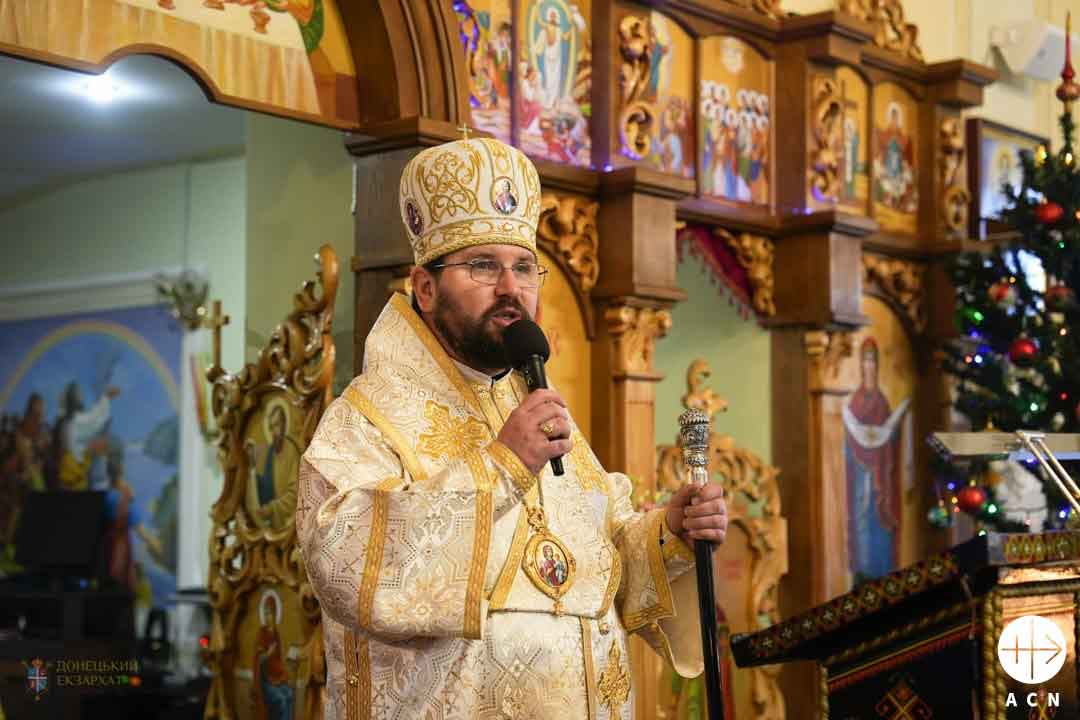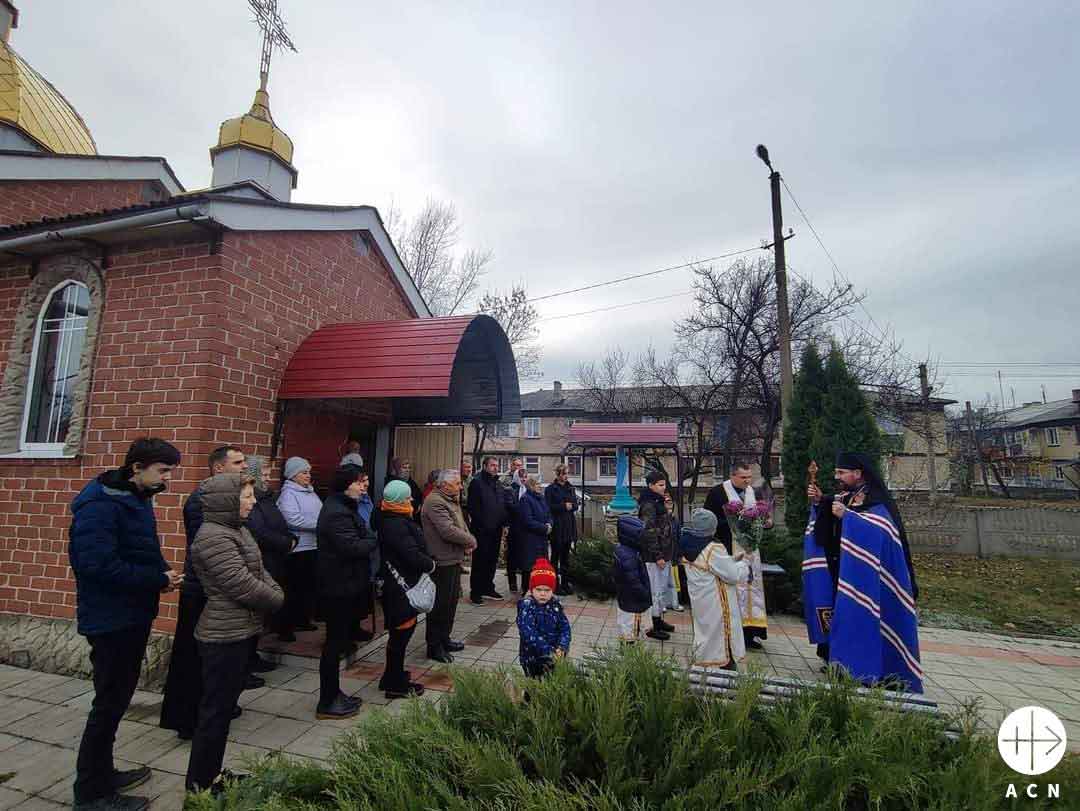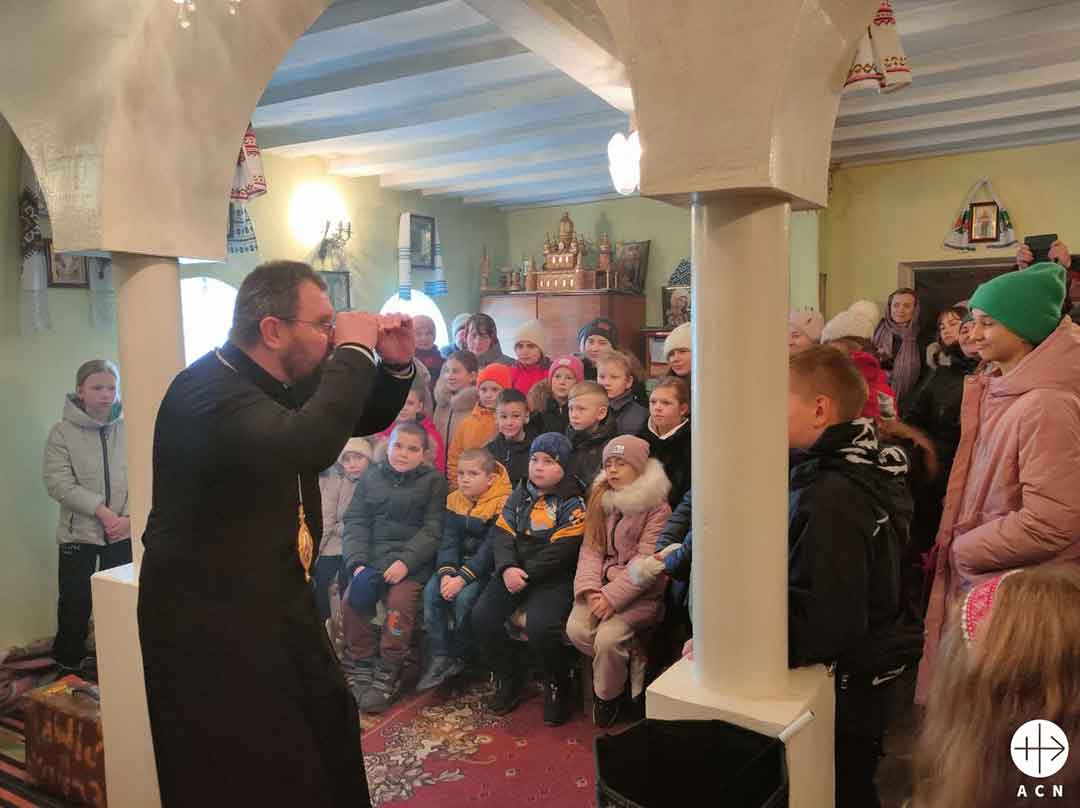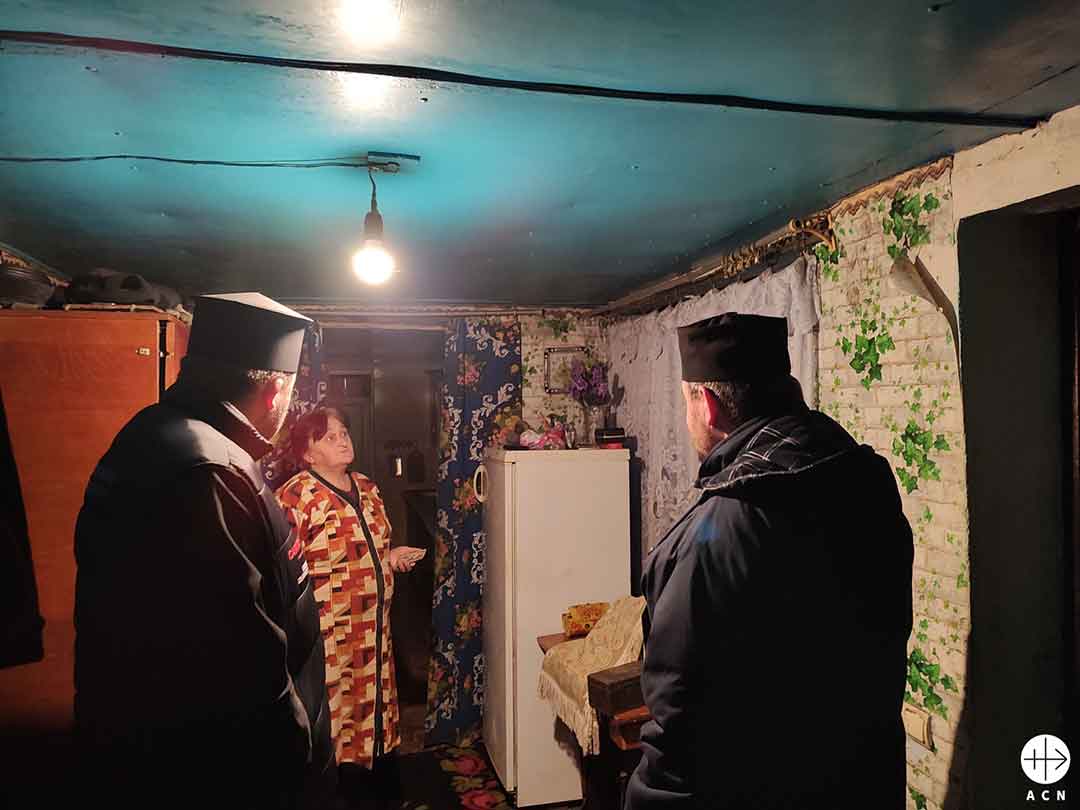Greek-Catholic Bishop of Donetsk: “Before the war we had over 80 parishes, but more than half closed, are under occupation or were destroyed”
At 45, the Ukrainian bishop, Maksym Ryabukha, is one of the youngest bishops in the world. He is also in charge of one of the most delicate territories in the world, east-central Ukraine, covering the regions of Donetsk, Luhansk, Dnipr and Zaporizhzhia. Half of his exarchate – the eastern equivalent of a diocese – is off-limits, occupied by Russian forces, and even the cathedral is closed. He refers to himself as a “bishop on wheels”, because he is constantly on the road to be close to his flock. The bishop visited the international headquarters of Aid to the Church in Need (ACN), which has been helping to provide his priests and religious with training to help young people overcome war trauma.

What is the current situation in your exarchate?
Increasingly worse. The drones make every place unsafe, including for civilians. Along the front line, some 30km from my territory, people leave their homes at night in fear of being crushed to death and go to sleep in the countryside by the lakes. One boy told me that he was sleeping with his entire family when they heard a bomb drawing closer, and realised that it could land right on their house. In just a few seconds they leapt out of bed and left the house, and soon the whole building was turned into a crater. An experience like that can crush you, it is very destructive.
What is life like for you?
We feel helpless, because it is as if nobody sees what is happening. What hurts most is seeing that the world remains silent while civilian areas are bombed and people are killed. From a practical standpoint, we can’t see a significant response from the world. The only thing that gives us hope is that God is stronger than the evil we can find in the world. We look at daily life from the perspective of Heaven, because sooner or later everything will end, and that end is called Paradise. The only question is how to get there. Every day is a new opportunity to take steps in that direction, and we do what we can.
How do you exercise your ministry as bishop?
I am a “bishop on wheels”, always visiting parishes to see my people, going into their homes, and that allows me to see the depths of human life.

What has changed since the invasion?
Before the war we had over 80 parishes, and now we have only 37 active parishes. The rest were closed, occupied or destroyed.
Is there any Catholic activity in the occupied areas?
Sadly, no. The laws of the occupation force forbid any affiliation with the Catholic Church, either Greek-Catholic or Latin rite, and it is very difficult to provide any sort of ministry there. My exarchate no longer has any priests in these territories, all our churches have been destroyed, or they are closed and people are not allowed to attend them.
And how are the people doing?
The worst isn’t the bombs, it’s the feeling of being forgotten, feeling alone or of being of no value to anybody. I receive word from the occupied territories about the bonds between believers. Despite the fact that their lives are in danger, they feel part of one Church: in support, in personal encounters, when they share their dreams and hopes, when they pray together, even though it is very dangerous and they cannot do so publicly. These things all give them the strength to keep going.
How many priests and religious are there in the rest of the exarchate?
We are two bishops, because there is also an emeritus who lives in the territory. Then we have 53 priests and eight religious, distributed between four regions. Several of the parishes have family centres, we have seven Caritas centres, homes for religious, and parish groups.
You were in Rome for the Jubilee of Young People with a group of girls and boys. What was that experience like?
It was very moving to walk the streets of Rome and to hear so many young people from the rest of the world say “We are with Ukraine” or “We are praying for Ukraine”. It was also very moving to visit the places of the martyrs of the first centuries, a testimony of a faith that does not crumble when faced with difficulties. It was also restful, because for us it is rare to live without hearing explosions and sirens, and to be able to sleep peacefully.

Despite all the difficulties, are there vocations?
We have 19 seminarians. This is remarkable, it is a large number for us, as we are not a big eparchy. These boys are great. They were nurtured in parish youth groups, and they have a deep experience of Christian life. They are kids who ask deep and meaningful questions. Both the boys and the girls are searching for meaning, they are brave in the face of life, and they have grown so much as human beings. Before people generally felt lost, they didn’t know what to do, because life was complicated. Now there is clarity: “I want to take responsibility for my life, and I want to do this.” And this feeling is contagious, when young people speak out, they strengthen each other.
The psychological drama of war causes many children to lose the ability to read, write or speak
What projects are Aid to the Church in Need helping you with?
The psychological drama of war causes many children to lose the ability to read, write or speak. We need specialists to help us work on the mental health of these youngsters. We need to learn how to help them, and that is why we are organising psychological training for our priests and those who work in the parishes.
We are also helping mothers and wives with children who lost their husbands in the war. Many people struggle to return to normal, but there is an inner obstacle, including among the young, to think that this person could still be alive, but lost his life due to somebody else’s stupidity.
Also, the people who live along the front line do not have access to food or hygiene products. Every day I hear from new people who say: “I have nothing, my house was destroyed, along with everything I owned. Please help me.” And that is where the social and humanitarian support comes in.
Another significant challenge is that in the winter they bomb the energy plants, and the electricity cuts out. Without light, there is no heating in the houses and it becomes impossible to find somewhere warm and safe. That is why our parishes are doing what they can to offer safe spaces, places where people can recover, with kitchens and other essential services.
Through our hands, God can touch and embrace these people who suffer, and give them a smile, and a little joy
What message would you like to give to ACN’s benefactors?
They cannot realise how much good their help does. It is not just the help they give, but the affection they make the recipient feel. None of those who receive help know who it comes from, but they do feel that someone is thinking of them, that they are loved.

Once we took some boxes of humanitarian aid to some old ladies in Sloviansk who our cook knew. They lived on the ninth floor. We climbed the stairs, rang the bell and were greeted by an elderly lady and her crippled husband, who was missing a leg. They were so happy to see us. While we chatted, we gave her the box. She opened it and you should have seen the look on her face, as she took out goods she hadn’t seen for years. She said: “Did you know I dreamed of eating this? Here we have nothing.” It wasn’t just that we took her the food, it was the fact that she felt that somebody loved her enough to take it to such a difficult destination.
I would like people who do good to know that even when we don’t know where it goes and what effect it will have, it is certain that God, through our hands, manages to touch and embrace those people who suffer and bring them a smile, a little joy, a little inner serenity. Thank you.


